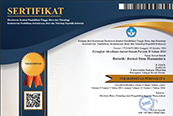Politics of Adat Revivalism in Ambonese Discursive Practices
(1) STPAK St. Yohanes Penginjil Ambon
(*) Corresponding Author
Abstract
In Indonesia, the emergence of indigenous revivalism (or adat revivalism) is equated with unequal treatment at the local level, such as the seizure of adat lands to be converted into national development concessions. The conversion of “negeri adat” (indigenous villages) in Ambon, which is the main locus of this study, represents an instance of this. Indigenous revivalism intends to fight for indigenous values and regain equality that was neglected during the New Order Regime. However, unfortunately, it has become rooted in the discourse of power. This indigenous euphoria in the Reformasi era did not answer the challenge of indigenous values, but instead got caught up in local political interests by bureaucratizing, managerializing, and/or administering indigenous values. The consequence is ethnic projection. The discourse of indigenous revival has turned into a discourse of ethnic identity revival. In that context, especially regarding the revival of indigenous discourse in Ambon, I would like to discuss three main issues, namely: genealogy, power relations, and subjectivity. The discussion of the third issue will utilize Michel Foucault’s critical discourse analysis method.
Keywords
Full Text:
PDF (Bahasa Indonesia)DOI: https://doi.org/10.24071/ret.v11i1.4629
Refbacks
- There are currently no refbacks.
Copyright (c) 2023 Willem Batlayeri

This work is licensed under a Creative Commons Attribution 4.0 International License.
Retorik: Jurnal Ilmu Humaniora is published by the Graduate Program in Cultural Studies at Sanata Dharma University, Yogyakarta, Indonesia.
Retorik is also available in print edition. Please click here for contact information.










